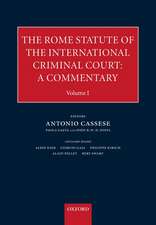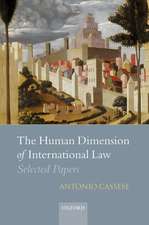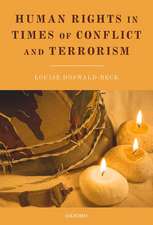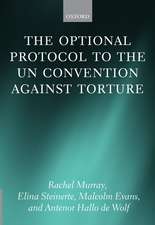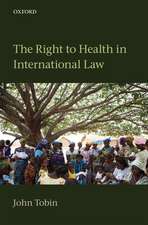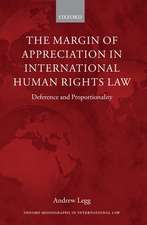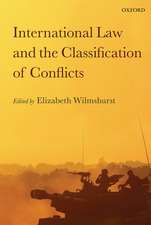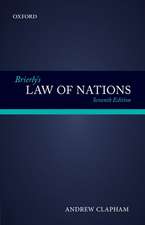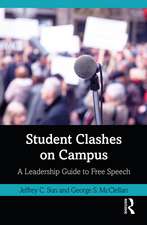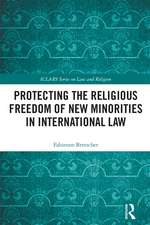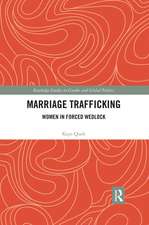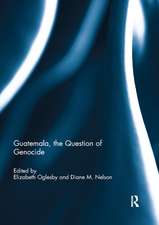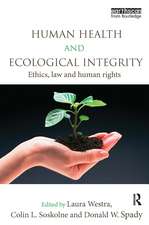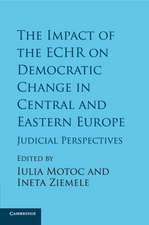The Oxford Handbook of International Law in Armed Conflict: Oxford Handbooks
Editat de Andrew Clapham, Paola Gaetaen Limba Engleză Hardback – 13 mar 2014
Din seria Oxford Handbooks
-
 Preț: 236.89 lei
Preț: 236.89 lei - 8%
 Preț: 358.80 lei
Preț: 358.80 lei - 17%
 Preț: 912.51 lei
Preț: 912.51 lei - 12%
 Preț: 307.94 lei
Preț: 307.94 lei - 25%
 Preț: 829.05 lei
Preț: 829.05 lei - 14%
 Preț: 987.01 lei
Preț: 987.01 lei - 26%
 Preț: 1376.97 lei
Preț: 1376.97 lei - 29%
 Preț: 929.22 lei
Preț: 929.22 lei -
 Preț: 303.54 lei
Preț: 303.54 lei - 26%
 Preț: 343.85 lei
Preț: 343.85 lei - 14%
 Preț: 278.15 lei
Preț: 278.15 lei - 29%
 Preț: 930.94 lei
Preț: 930.94 lei - 30%
 Preț: 1065.79 lei
Preț: 1065.79 lei - 15%
 Preț: 357.85 lei
Preț: 357.85 lei -
 Preț: 263.45 lei
Preț: 263.45 lei - 23%
 Preț: 839.81 lei
Preț: 839.81 lei - 16%
 Preț: 264.39 lei
Preț: 264.39 lei - 33%
 Preț: 737.68 lei
Preț: 737.68 lei - 33%
 Preț: 725.45 lei
Preț: 725.45 lei - 26%
 Preț: 342.76 lei
Preț: 342.76 lei - 25%
 Preț: 366.95 lei
Preț: 366.95 lei - 13%
 Preț: 304.72 lei
Preț: 304.72 lei - 16%
 Preț: 263.35 lei
Preț: 263.35 lei - 12%
 Preț: 267.23 lei
Preț: 267.23 lei - 33%
 Preț: 815.51 lei
Preț: 815.51 lei - 6%
 Preț: 346.76 lei
Preț: 346.76 lei - 22%
 Preț: 1095.69 lei
Preț: 1095.69 lei - 29%
 Preț: 931.18 lei
Preț: 931.18 lei - 29%
 Preț: 942.77 lei
Preț: 942.77 lei - 24%
 Preț: 1071.82 lei
Preț: 1071.82 lei - 23%
 Preț: 1052.07 lei
Preț: 1052.07 lei - 21%
 Preț: 863.03 lei
Preț: 863.03 lei - 30%
 Preț: 815.25 lei
Preț: 815.25 lei - 29%
 Preț: 855.42 lei
Preț: 855.42 lei - 30%
 Preț: 842.04 lei
Preț: 842.04 lei - 11%
 Preț: 258.32 lei
Preț: 258.32 lei - 29%
 Preț: 859.51 lei
Preț: 859.51 lei - 29%
 Preț: 1083.61 lei
Preț: 1083.61 lei - 15%
 Preț: 273.41 lei
Preț: 273.41 lei - 30%
 Preț: 818.12 lei
Preț: 818.12 lei - 11%
 Preț: 365.23 lei
Preț: 365.23 lei - 21%
 Preț: 359.87 lei
Preț: 359.87 lei - 13%
 Preț: 264.87 lei
Preț: 264.87 lei - 9%
 Preț: 307.08 lei
Preț: 307.08 lei - 28%
 Preț: 845.79 lei
Preț: 845.79 lei - 23%
 Preț: 855.11 lei
Preț: 855.11 lei - 21%
 Preț: 861.04 lei
Preț: 861.04 lei - 12%
 Preț: 250.34 lei
Preț: 250.34 lei
Preț: 1173.87 lei
Preț vechi: 1454.44 lei
-19% Nou
Puncte Express: 1761
Preț estimativ în valută:
224.65€ • 233.67$ • 185.46£
224.65€ • 233.67$ • 185.46£
Carte tipărită la comandă
Livrare economică 03-09 aprilie
Preluare comenzi: 021 569.72.76
Specificații
ISBN-13: 9780199559695
ISBN-10: 0199559694
Pagini: 1008
Dimensiuni: 181 x 249 x 57 mm
Greutate: 1.64 kg
Editura: Oxford University Press
Colecția OUP Oxford
Seria Oxford Handbooks
Locul publicării:Oxford, United Kingdom
ISBN-10: 0199559694
Pagini: 1008
Dimensiuni: 181 x 249 x 57 mm
Greutate: 1.64 kg
Editura: Oxford University Press
Colecția OUP Oxford
Seria Oxford Handbooks
Locul publicării:Oxford, United Kingdom
Recenzii
Clapham and Gaeta are to be congratulated for their Herculean efforts in assembling a book that fairly represents the vast disagreement and contestation that currently inhabits the legal regulation of warfare. The Handbook paints a complex picture of overlapping legal domains all pushing and competing to regulate military conduct. Whether or not this competitive process is coherent depends on which author in the Handbook is asked, a pluralism that accurately reflects the state of the field today.
The Handbook doubtless represents a basic work on international law application in armed conflicts and it is certainly appropriate to determine to a broad extent the further discussion of many of the subjects so diligently examines.
The book is also quite a fresh approach in an increasingly crowded market. The high rate of new publications on international humanitarian law and its associated topics continues, so it is important that entrants have something different to offer. The distinguishing features of this book are its multi-dimensional approach, the calibre of its contributors, and their willingness to offer no-holds-barred opinions on controversial topics. These features comfortably imbue the book with the requisite value-add... If this book were read cover to cover, the reader would be left with a comprehensive survey of the most important legal issues in the context of modern armed conflicts. It is therefore recommended to those who are seeking this advanced understanding from a multidimensional, critical perspective.
...this handbook is a useful, up-to-date and comprehensive tool for scholars and practitioners, especially judges, dealing with the legal issues arising out of armed conflicts.
The stated purpose of the Handbook is 'to provide grounding for those who would like to go further with their understanding of the law applicable in armed conflict.' The Handbook fulfils this purpose amply. Not only does it provides a comprehensive introduction to the law applicable in armed conflict, it also offers ample food for thought on the structure of the international legal system and the character of international legal obligations.
One remarkable feature of The Handbook is its exhaustiveness: it provides a comprehensive overview of the multiple rules and rights that come into play during an armed conflict. Furthermore, it clearly stems from the sum of the essays that the legal framework applicable to an armed conflict is not single-fold, but multifaceted. This handbook is a useful, up-to-date and comprehensive tool for scholars and practitioners, especially judges, dealing with the legal issues arising out of armed conflicts.
The Handbook doubtless represents a basic work on international law application in armed conflicts and it is certainly appropriate to determine to a broad extent the further discussion of many of the subjects so diligently examines.
The book is also quite a fresh approach in an increasingly crowded market. The high rate of new publications on international humanitarian law and its associated topics continues, so it is important that entrants have something different to offer. The distinguishing features of this book are its multi-dimensional approach, the calibre of its contributors, and their willingness to offer no-holds-barred opinions on controversial topics. These features comfortably imbue the book with the requisite value-add... If this book were read cover to cover, the reader would be left with a comprehensive survey of the most important legal issues in the context of modern armed conflicts. It is therefore recommended to those who are seeking this advanced understanding from a multidimensional, critical perspective.
...this handbook is a useful, up-to-date and comprehensive tool for scholars and practitioners, especially judges, dealing with the legal issues arising out of armed conflicts.
The stated purpose of the Handbook is 'to provide grounding for those who would like to go further with their understanding of the law applicable in armed conflict.' The Handbook fulfils this purpose amply. Not only does it provides a comprehensive introduction to the law applicable in armed conflict, it also offers ample food for thought on the structure of the international legal system and the character of international legal obligations.
One remarkable feature of The Handbook is its exhaustiveness: it provides a comprehensive overview of the multiple rules and rights that come into play during an armed conflict. Furthermore, it clearly stems from the sum of the essays that the legal framework applicable to an armed conflict is not single-fold, but multifaceted. This handbook is a useful, up-to-date and comprehensive tool for scholars and practitioners, especially judges, dealing with the legal issues arising out of armed conflicts.
Notă biografică
Andrew Clapham is Professor of Public International Law at the Graduate Institute of International Studies, Geneva. Before he joined the Graduate Institute of International Studies Institute in 1997, he was the Representative of Amnesty International to the United Nations in New York. His current research relates to the role of non-state actors in international law and related questions in human rights and humanitarian law. Andrew Clapham is the Director of the Geneva Academy of International Humanitarian Law and Human Rights. His publications include Human Rights: A Very Short Introduction (2007), Human Rights Obligations of Non-State Actors (2006), and International Human Rights Lexicon (2005), with Susan Marks.Paola Gaeta (PhD in Law, European University Institute, 1997) was Assistant Professor (1998), Associate Professor (2001) and then Tenured Professor (2001-2010) of Public International Law at the University of Florence. She is currently Tenured Professor of International Criminal Law at the Law Faculty of the University of Geneva and Adjunct Professor of International Criminal Law at the Graduate Institute for International and Development Studies. Since 2007, she is Director of the LL.M. Programme in International Humanitarian Law of the Geneva Academy of International Humanitarian Law and Human Rights and since 2011 Director of the Academy itself. She is a Member of the Editorial Board of the Journal of International Criminal Justice and of the Editorial Board of the European Journal of International Law. Her publications include The UN Genocide Convention: A Commentary (ed.), (2009).

